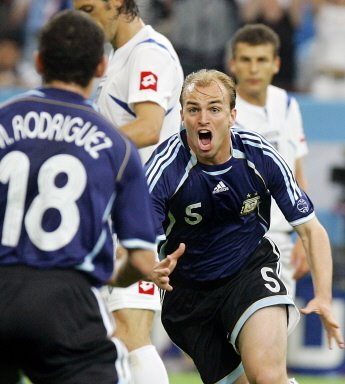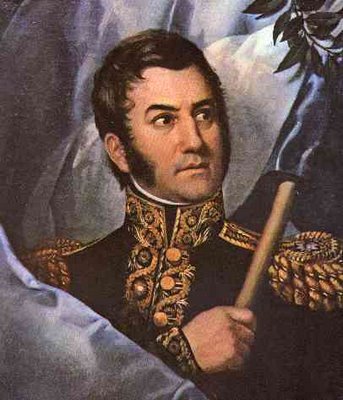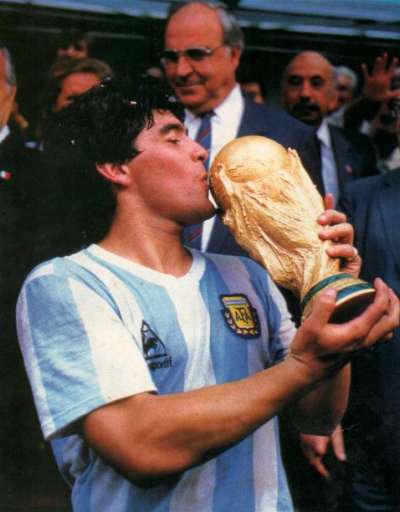So long Group of Death, thanks for the memories; yours, Argentina
Though I have no unique insights into what took place yesterday, to write a blog set in Argentina and not mention THE GAME would be a thundering silence, as the oxymoron goes. The significance of Argentina's 6-0 dismantling of Serbia and Montenegro yesterday, considering just the impact on the tournament standings, is actually relatively minor. Argentina was expected to win, expected to finish in the top two of Group C, and expected to establish themselves as a contender in doing so. Wednesday's game between Argentina and Holland will decide who finishes on top of the group, but both teams have now assured their passage to the Round of 16. Had Argentina earned anything short of their six points thus far it would have been a disappointment.
The significance of the game to the country, however, is simply that it was one of the greatest World Cup matches in Argentina's history. The game was a majestic rout; a performance so dominating that the Serbians & Montenegrans were rendered foils for Argentine brilliance, no more a threat than the Washington Generals. Fans were delirious with the spectacle, and the players - all of them - described the experience as "a dream", or "dreamlike", or some similar nod to the sense that what just happened was so much better than what could or should have been. The game, as most of the commentators and columnists and ex-player-turned-talking heads have noted, was perfect. Looking for a quick start? Maxi Rodriguez gets the party started in the sixth minute. For consistency? Three goals in the first half, three in the second. Teamwork? 25 passes before Cambiasso drives in the second goal. Individual skill? Carlos Tevez breaking through one defender, and another, and bending the ball past the helpless keeper for the fifth goal. Even Leo Messi - the 18-year-old phenom who's face is becoming about as ubiquitous here as Maradona's - capped the scoring in his first ever World Cup match.
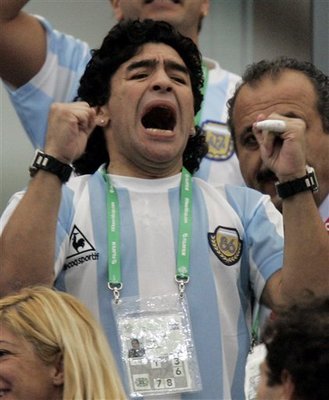
Now, obviously it's too soon for Argentines to clear their schedules on July 9th, or RSVP for the victory party that night. But the world has been put on notice, and while Argentina hasn't looked in finer form since 1986, their opponents are sputtering. The English got their result, but needed 83 minutes to pull ahead of Trinidad & Tobago; the Germans just squeaked by Poland with an extra time goal; the Mexicans couldn't beat the Angolans, the Italians couldn't beat the U.S., and even the mighty Brazilians looked vulnerable in their opening match against Croatia. When planning out various scenarios for this tournament - and adjusting my travel schedule accordingly - I realized that finishing on top of Group C would give Argentina the best chance of avoiding any serious competition until the semi-finals. Avoiding England, Brazil, and Spain seemed the best way to assure a good result. Now those teams ought to be asking themselves an equally pressing question: "how can we avoid Argentina?"
This city is buzzing. There wasn't an Argentine friend I spoke with yesterday that wasn't in celebration mode, not one who wasn't making comparisons to '86; there wasn't a bus on the street from 10:00 to 12:00, a business that didn't take time off for the game, a bakery with any medialunas (mini croissants) in stock by 10:30. Six is the number. 1986, 2006. Six goals, six more games. Six more victories to an event of epic proportions, and if you think I'm exaggerating, well . . . ask a porteño. You're in the minority.
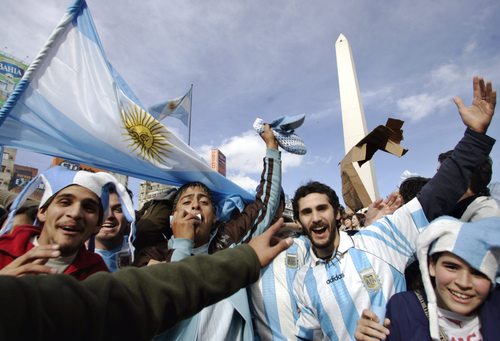
In other news, it turns out that they used to show "Different Strokes" down here, only they called it "Blanco y Negro", which means "White and Black". Rather lacking in subtlety, no? Anyway, when I found this out from one of my Argentine friends, I naturally asked after Gary Coleman's famous line. I refused, just refused to believe that such an iconic catchphrase could be accurately translated. She told me that whenever he was responding to his brother with his trademark incredulity, Arnold would say "de que estás hablando viejo?" This literally translates to "of what are you speaking elder brother?", which I pointed out is totally not in the spirit of the original catchphrase, but she then told me that the more colloquial translation of the phrase is "what are you talking about older brother?" That's fine, except that of course Arnold didn't say "what are you talking about Willis?", he said "whuchutalkinboutWillis?", dropping only the patently superfluous syllables from the clause. Now, Spanish is a syllabic language, and unlike English-speakers, people really say every syllable down here, and my friend simply COULD NOT imitate Gary Coleman accurately, but only get as close as "whatareyoutalkinabouWillis", which is no more Gary Coleman-esque than the same line in Swahili. Checkmate.
Oh, and Kermit the Frog in this country? Rana René. WTF?
